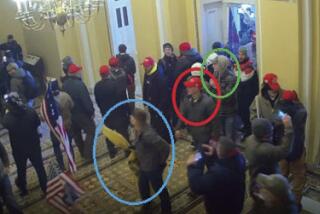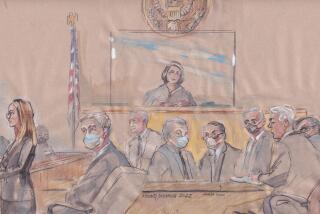Lonetree Guilty on All 13 Counts in Spy Trial : First Marine to Draw Espionage Conviction Could Get Life Term
- Share via
QUANTICO, Va. — Sgt. Clayton J. Lonetree, a former guard at the U.S. Embassy in Moscow, was convicted of espionage Friday night--the first Marine in the proud 212-year history of the corps found guilty of spying.
A court-martial jury of eight Marine officers returned the verdict--guilty on all 13 counts of espionage, larceny and conspiracy--after 3 hours, 45 minutes of deliberation.
Lonetree, a 25-year-old American Indian from St. Paul, Minn., stood rigidly at attention and showed no emotion as he faced the jury foreman reading the verdict.
Separate Proceeding
The jury will return Monday for a separate sentencing proceeding. Lonetree faces a maximum of life imprisonment. Under military law, espionage can carry a death penalty, but the government waived the right to seek capital punishment after difficulties developed in the investigation of the “sex-and-spy” scandal involving Marine guards at the most sensitive of all U.S. diplomatic installations.
One of Lonetree’s lawyers, William M. Kunstler, said after the verdict: “We shall appeal. We shall fight this to the end.”
Lonetree was silent as he was led out of the military courtroom to a van that took him back to the Quantico Marine Base brig.
In closing arguments, Kunstler contended that Lonetree was guilty only of being “profoundly stupid” by becoming involved with an attractive Soviet woman who was a translator at the embassy--a woman who introduced Lonetree to her “Uncle Sasha.” Uncle Sasha turned out to be a KGB operative who the prosecution said received secret documents and information from Lonetree.
But the chief prosecutor, Maj. David Beck, told the jury in final arguments that Lonetree “sold out our national defense . . . (and) is a traitor . . . a real-life Benedict Arnold.”
“While he was in the uniform of the United States of America he betrayed his country,” Beck declared as the monthlong court-martial went to the jury.
Playing ‘Foolish’ Game
Kunstler in turn told the jury that Lonetree had stumbled into contacts with the Soviet agents and then had tried to expose the KGB. “He was playing a foolish, dangerous game . . . he lost that game,” Kunstler said in urging acquittal.
The case went to the jury at 5:12 p.m. after seven days of testimony and weeks of legal maneuvering. Under military law, a verdict can be returned when three-fourths of the jurors--in this instance, six of the officers--agree.
Lonetree’s arrest last December sent shock waves through the Marines’ elite unit of guards at embassies around the world. It led to the recall of all the Marine guards at U.S. embassies and consulates in the Soviet Union, and brought major changes in security procedures at diplomatic installations worldwide.
Lonetree was charged with espionage and the other offenses after voluntarily telling U.S. intelligence agents of his sexual affair with Violetta Sanni, a translator at the Moscow embassy. He was accused of stealing sensitive documents and passing secrets to the KGB in Moscow and Vienna while stationed with Marine guard units at those embassies between 1984 and 1986.
Told of Introduction
In sworn statements admitted into evidence over the objections of defense lawyers, who argued that Lonetree had been tricked and coerced by U.S. investigators, the Marine said Sanni introduced him to Uncle Sasha, a man identified in testimony as KGB operative Alexei Yefimov.
Lonetree said in the statements that he had met repeatedly with Uncle Sasha and gave him documents and other information.
Defense lawyers contended the documents were “unclassified junk,” but the prosecution contended they included floor plans for the most sensitive sections of embassies in Moscow and Vienna as well as identity cards for covert U.S. intelligence agents.
Received $3,500
Prosecutors said Lonetree received $3,500 from the KGB. “He sold out our national defense and intelligence interests to a nation which, since the 1950s, has declared our country public enemy No. 1,” Beck said in his closing arguments.
He scoffed at Lonetree’s defense that his contacts with the Soviet agents came only after he had decided to try to infiltrate the KGB as a double agent. “To be a double agent, one must first be a spy,” Beck said.
As for the defense contention that Lonetree was acting out a fantasy fueled by his reading of spy novels, the prosecutor said the former guard was “not an innocent Walter Mitty . . . he is a real-life Benedict Arnold,” a reference to the infamous official who spied for the British during the Revolutionary War.
Showed ‘Real Courage’
Kunstler said Lonetree showed “real courage” by volunteering to U.S. intelligence agents in Vienna that he had been dealing with the KGB. “If he hadn’t come forward, Sasha might still be out there yet with other Marines, other Americans,” the lawyer said.
“We are candidly admitting he failed to report” his liaison with the Soviet woman who introduced him to Sasha, Kunstler said in his closing arguments, referring to regulations forbidding Marine guards from fraternizing with Soviet citizens.
“He didn’t believe what he was doing was wrong,” Kunstler said in court of Lonetree’s affair with the woman and his initial contacts with Sasha.
After standing ramrod straight at attention while listening to the verdict of the panel of officers--three lieutenant colonels, two majors and three captains--Lonetree sat at the defense table in the small courtroom, his hands folded at his chin while the judge dismissed court.
He then embraced his mother, Sally Tsosie, a Navajo Indian from Arizona who held an eagle feather as a symbol of peace. He also hugged Kunstler, who said afterward: “He was shaking, but he took it like a Marine. He took it and he took it well.”
‘Corps Pride, Pressure’
“Marine justice failed him,” Kunstler told reporters later outside the courtroom. “Corps pride, corps pressure had a lot to do with this verdict,” said the New York lawyer who gained nationwide attention more than a decade ago with his involvement in civil rights cases and his defense of such anti-war protesters as the Chicago Seven.
Lonetree’s mother charged the verdict was racially motivated. “American Indians are treated like this all through the centuries and still today,” she said. “I taught my son to be an honest, law-abiding citizen. All he was doing, he was being honest and turned himself in and look how he’s being treated.”
Another defense lawyer, Michael V. Stuhff of Las Vegas, complained after the verdict about rulings by the presiding judge that he said prevented Lonetree from presenting valuable evidence.
‘Coercive’ Techniques
He also claimed, as he had during the trial, that agents of the Naval Investigative Service used “onerous, coercive, blackjack type of techniques” in its worldwide probe of the case of other security weaknesses at U.S. embassies.
Although several other Marine embassy guards had been detained during the investigation, Lonetree was the only one to face espionage charges.
Charges Dropped in Case
Earlier this summer, the Marines dropped all charges against Cpl. Arnold Bracy, a former Moscow embassy guard who the government first alleged was Lonetree’s accomplice in a scheme to allow Soviet agents access to the most sensitive areas of the embassy.
Another Marine who had been a guard at the U.S. consulate in Leningrad was held for several weeks on suspicion of espionage but was freed after authorities concluded that the statute of limitations had expired on his alleged offenses.
Still other Marines have received administrative punishment for fraternizing with Soviet citizens or for failing to report contacts with foreign women while serving as embassy guards.
Lonetree’s lawyers contended during and after the trial that the Marines were being blamed for security violations that should be blamed on diplomatic, intelligence and investigative officials.
Lonetree “has become the scapegoat,” Kunstler told reporters after the verdict. “He’s the scapegoat for the State Department, the CIA and the NIS.” The lawyer said he would argue for leniency at Monday’s sentencing, acknowledging that Lonetree “may face a long time in prison.”
More to Read
Sign up for Essential California
The most important California stories and recommendations in your inbox every morning.
You may occasionally receive promotional content from the Los Angeles Times.













